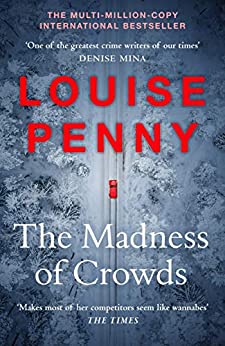 PREVIEW COPY: Louise Penny has published earlier novels featuring Inspector Armand Gamache and reviewers have been enthusiastic with comments such as “Penny’s novels unravel criminal schemes that have moral consequences… what stays with the reader are the tender passages, the human insights, the reminders of what makes life worth living.” and “Impeccable…electrifying….breathtakingly well done.” So I am looking forward to reading her latest novel.
PREVIEW COPY: Louise Penny has published earlier novels featuring Inspector Armand Gamache and reviewers have been enthusiastic with comments such as “Penny’s novels unravel criminal schemes that have moral consequences… what stays with the reader are the tender passages, the human insights, the reminders of what makes life worth living.” and “Impeccable…electrifying….breathtakingly well done.” So I am looking forward to reading her latest novel.
The Madness of Crowds is a whodunnit whilst diving into the moral maze surrounding death especially suicide and euthanasia. The timeframe encompasses Covid and one of the protagonists is in favour of letting the elderly and vulnerable die. Pleasant thought!
The author has chosen characters to play out around these themes. So we have a Peace Prize Sudanese woman who escaped torture and rape by brutally murdering her captors, a Professor of Statistics who proposes “euthanasia” for the elderly and vulnerable, another professor who may have killed his severely disabled daughter, and a friend who abhors euthanasia. Another retired scientist has been involved in medical experiments on unwitting volunteers. Many of the volunteers have subsequently died or committed suicide. Finally one of the cops has a child with severe problems. One of the highlights of the novel how she weaves the arguments through the novel’s protagonists.
So the story opens with the Professor of Statistics, Abigail giving a lecture at a Quebec university. There is an attempt on her life but survives due to the quick action of Inspector Gamache. An investigation ensues. Against this background, there is a New Years Party in honour of Abigail accompanied by her girlfriend Debbie and the Peace Prize Sudanese woman Haniya. Around midnight Debbie is murdered, and the potential list of perpetrators is large. Inspector Gamache leads us through a maze of motives, and the finger of suspicion jumps from one character to another. Unfortunately, it goes back and forth repetitively, and there are several characters who had a compelling motive to kill. Even in the big reveal, the police have little on no evidence. Frankly, in the end, I did not care – any of the characters under investigation could have been the murderer.
The moral maze questions were interesting and formed a constant background issue along with the family life of the Police families. The list of family members is just too long for easy reading!
It is a clever idea to use historical facts as a theme, and the real-life events surrounding Professor Ewen Cameron at McGill University were disturbing. These experiments are significant in the novel but nevertheless quite appalling.
One of Inspector Gamache’ traits is to use famous (and not so famous) quotations. Initially this is quite appealing but eventual jars and even one of the policemen agrees! The ending is weak with a Poirot type meeting, and at the big reveal, a rifle is clearly visible and within reach of possible murderers. Three senior policemen (with years of experience) are present yet fail to remove or disarm the rifle. Needless to say, one of the possible murderers grabs the rifle and threatens the police. Ridiculous.
The novel is not without its charms and clever dialogue but as a whodunnit it is disappointing. Whether the dialogue, human insights and the moral maze themes overcome its shortcomings I am not sure.




Preview copy provided by Hodder & Stoughton – release 24th August 2021

